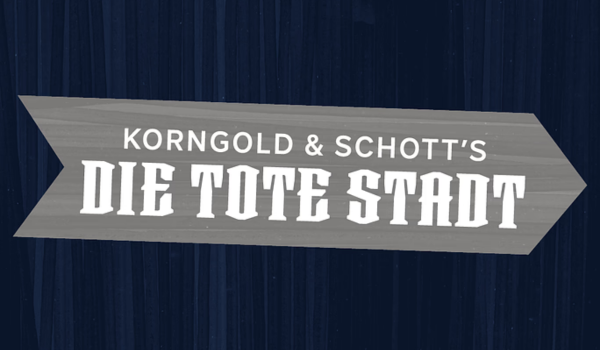
By Katy Lindhart
Coming soon: experience Erich Wolfgang Korngold’s rarely-performed Die tote Stadt (The Dead City), a hauntingly beautiful masterpiece exploring love, loss, and the power of memory. Presented in concert in collaboration with the Boston Symphony Orchestra, Die tote Stadt’s rich emotional depth and lush musical score will captivate both opera enthusiasts and newcomers alike.
The story of Die tote Stadt
Die tote Stadt is set in the somber, mysterious city of Bruges, where Paul lives in self-imposed isolation following the death of his beloved wife, Marie. Struggling to move on from the past, his home has become a shrine to her memory, filled with relics and mementos.
When Paul meets Marietta, a lively and bold young woman who bears an uncanny resemblance to Marie, his world is changed forever. Her appearance rekindles conflicting emotions in Paul—desire, guilt, and hope of a new beginning. Their relationship becomes a surreal, psychological battle between his past and his potential future.
Meet Erich Wolfgang Korngold
Erich Wolfgang Korngold (1897–1957) was an Austrian composer, conductor, and pianist who fled Europe in the mid-1930s and later became a U.S. citizen, earning acclaim as one of Hollywood’s most influential composers. A child prodigy, Korngold came to prominence at age 11 with his ballet Der Schneemann. He composed Die tote Stadt in 1921, aged just 23.
In 1934, responding to the rise of the Nazi regime and at the invitation of director Max Reinhardt, Korngold moved to Hollywood and began composing film scores. He became a pioneer of film music, scoring 16 films in total, including Captain Blood (1935), Anthony Adverse (1936), and The Adventures of Robin Hood (1938), and winning two Oscars. Although his late Romantic style had fallen out of fashion by the time of his death in 1957, a 1972 RCA Red Seal album—produced by his son George—sparked renewed interest in his work, including his Violin Concerto in D, Op. 35, which incorporates themes from his film scores and remains a concert hall favorite.
The music of Die tote Stadt
The score is a gorgeous blend of late-Romantic lushness and the new ideas of the early 20th-century, showcasing Korngold’s prodigious talent for dramatic writing. The opera’s score brims with sweeping melodies, rich orchestration, and emotionally-charged harmonies that transport audiences into the dreamlike world of the story.
At the heart of the opera are its two most famous musical moments: “Glück, das mir verblieb” (often known as “Marietta’s Lied”), a bittersweet moment between Paul and Marietta, and “Mein Sehnen, mein Wähnen,” a darkly romantic aria in the Viennese operetta style. These pieces, with their soaring melodies and poignant beauty, have earned a place among the most beloved moments in opera.
Korngold’s music seamlessly blends elements of Wagnerian drama, Puccinian lyricism, and his own unique voice. His intricate orchestral writing paints vivid emotional landscapes, shifting effortlessly between moments of introspection, passion, and surrealism. The interplay of lush strings, shimmering winds, and dramatic brass creates a soundscape that heightens the opera’s tension and dreamlike atmosphere.
An all-star cast
Our production of Die tote Stadt will feature some of the world’s most prominent talent, including lauded soprano (and new BLO board member) Christine Goerke as Marietta. Tenor Brandon Jovanovich sings Paul, alongside a cast that includes BLO Jane & Steven Akin Emerging Artist alumnus Neal Ferreira as Gaston, and baritone Elliot Madore, recently seen in our production of Eurydice, as Fritz. Elisa Sunshine appears as Juliette, with Karen Cargill as Brigitte, Joshua Sanders as Victorin, Terrence Chin-Loy as Graf Albert, and Andrzej Filończyk as Frank. Music Director of the Boston Symphony Orchestra, Andris Nelsons, conducts.
Don’t miss Die tote Stadt
Die tote Stadt, presented by Boston Lyric Opera and Boston Symphony Orchestra, offers a rare opportunity to experience an opera that balances heartfelt emotion with stunning musical craftsmanship. Whether you’re a long-time fan of Korngold or discovering his work for the first time, this production promises an unforgettable evening at the theater.
Thank you for reading CODA! Coda comes from the Latin word for “tail,” and in music, it indicates an additional passage at the end of a piece, a final flourish that complements what’s come before. CODA goes beyond the curtain call to explore this unique and astonishing art form. Whether you’re a first-time opera-goer or a seasoned audience member, CODA is for you. Biweekly, we’ll enhance your experience of opera with behind-the-scenes highlights, educational articles, listening lists, and much, much more!
Tickets are on sale now for our star-studded 2024/25 season! Up next: Christine Goerke in Die tote Stadt, Anthony Roth Costanzo in Vivaldi’s The Seasons; followed by Brandie Sutton and Jamie Barton in Rodgers & Hammerstein’s American classic, Carousel.Want to learn more? Sign up for our mailing list to stay up to date on all things BLO.
